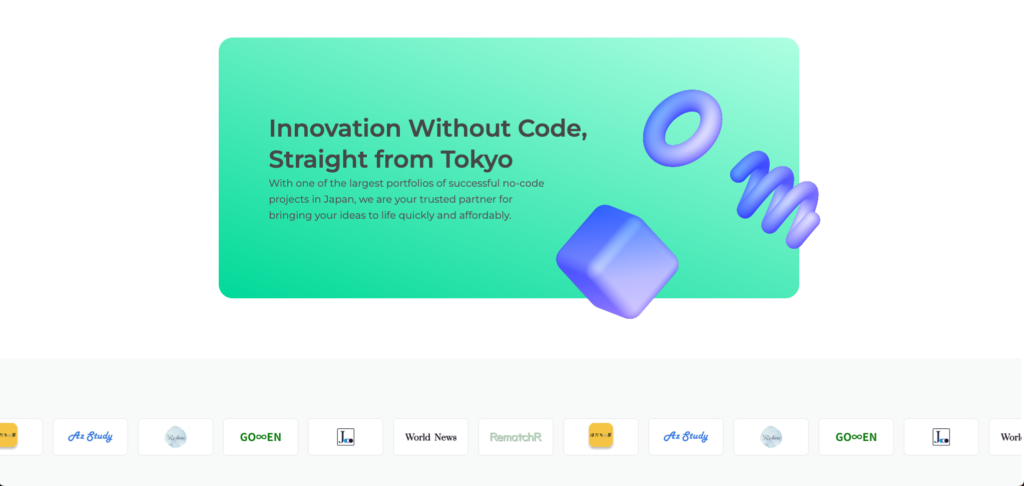Web development outsourcing to Asia offers businesses a strategic balance of quality, cost-efficiency, and specialized talent. This guide explores top Asian countries for web development outsourcing, their benefits, challenges, and how to select the right development partner.
Straight from Tokyo
Top Countries in Asia for Web Development Outsourcing
Japan: Design and User Experience Mastery

Japan distinguishes itself through exceptional design aesthetics and meticulous attention to detail. Japanese developers bring unmatched precision to visual design, typography, and user interface refinement, complemented by rigorous code quality and performance standards.
Their cultural emphasis on user experience and emotional design elements creates websites that resonate deeply through thoughtful interaction design and visual harmony. Japanese partners excel when visual sophistication and technical precision outweigh cost considerations, particularly for premium brands and user-centric applications.
India: The Established Powerhouse

India dominates the web development outsourcing landscape with 1.5 million annual engineering graduates and decades of industry experience. Developers charge $25-$49 per hour, offering 60-70% savings compared to Western markets while delivering strong full-stack development, particularly in JavaScript frameworks, PHP, and enterprise solutions.
With its high English proficiency (28th in the EF English Proficiency Index) and mature IT hubs in Bangalore, Hyderabad, and Pune, India excels in complex, large-scale web projects requiring deep technical expertise and established development processes.
Vietnam: The Rising Star

Vietnam has rapidly emerged as a competitive web development outsourcing destination, combining quality with affordability.
- Technical Foundation: Strong STEM education creating solid programming fundamentals
- Competitive Rates: Developer costs of $25-$40 per hour with excellent value-to-quality ratio
- Modern Expertise: Growing capabilities in React, Angular, and Vue.js frameworks
- Government Backing: National policies actively supporting IT sector growth
Companies like Savvycom and LTS Group demonstrate Vietnam’s strength in mobile-responsive web development, e-commerce solutions, and cross-platform applications.
The Philippines: Cultural Compatibility Champion

The Philippines excels through exceptional English proficiency (second in Asia per EF Index) and natural cultural alignment with Western business practices. Filipino developers ($25-$49 hourly) offer substantial savings while minimizing communication barriers through near-native language skills.
Their technical strengths in content management systems, e-commerce platforms, and responsive design make the Philippines ideal for customer-facing websites and content-heavy platforms where consistent communication is essential throughout development.
China: Scale and Specialization

China offers unmatched development scale and specialization in emerging technologies. With the world’s largest developer pool, Chinese teams excel in progressive web apps, AI integration, and interactive experiences. They provide unique expertise in China-specific solutions like WeChat mini-programs, supported by world-class technical infrastructure.
Companies like Beansmile and Digital Lantern deliver sophisticated, high-performance web solutions, though clients should be prepared to navigate potential language barriers.
Singapore: Premium Quality Hub

Singapore represents a premium destination focusing on quality and specialized expertise.
- Financial Technology: Advanced capabilities in fintech, security, and enterprise solutions
- Legal Protection: Robust frameworks for intellectual property and data security
- Innovation Leadership: Cutting-edge expertise in emerging web technologies
- Quality Processes: Rigorous development methodologies and testing practices
While rates are higher ($50-99 hourly), Singapore excels in high-value projects requiring sophisticated security, compliance features, or innovative approaches.
Benefits of Outsourcing Web Development to Asia
Significant Cost Advantages
Outsourcing to Asia delivers immediate financial benefits through development rates 40-70% below North American and Western European markets. Beyond direct labor savings, companies eliminate infrastructure costs, recruitment expenses, and training investments.
Asian partners typically offer flexible engagement models from fixed-price projects to dedicated teams, allowing businesses to structure arrangements that optimize budgets while maintaining quality. This cost efficiency enables more ambitious development goals without compromising standards.
Access to Specialized Expertise
Asian outsourcing destinations provide access to vast specialized talent pools often unavailable locally.
- Technical Diversity: Extensive expertise across numerous frameworks and platforms
- Emerging Technologies: Skilled developers in AI, blockchain, and advanced interfaces
- Domain Knowledge: Specialists with experience in specific business sectors
- Team Flexibility: Ability to configure teams with precise skill combinations
This expertise enables companies to build sophisticated web solutions with cutting-edge technologies without maintaining these specialized skills in-house.
Time Zone Advantages
Asia’s geographical positioning creates productive development cycles that accelerate project timelines. When your team finishes their workday, Asian developers begin theirs, creating continuous progress through “follow-the-sun” development that compresses schedules without requiring overtime.
This arrangement also enables maintenance and support outside your business hours, resolving issues overnight before your team returns to work—particularly valuable for global applications requiring 24/7 monitoring. With proper management, time differences become a strategic advantage rather than a challenge.
Scalability and Flexibility
Asian development partners provide exceptional resource flexibility compared to in-house teams. You can quickly expand teams when project scope grows or deadlines tighten without lengthy hiring processes, then scale down between phases to optimize costs without complex personnel changes.
Specialized experts can join for specific development components (UI/UX design, security implementation) precisely when needed, and parallel development tracks can accelerate timelines. This adaptability helps businesses respond effectively to changing market conditions and requirements.
Key Considerations When Outsourcing Web Development to Asia
Communication Challenges
Effective communication across cultural and linguistic boundaries requires deliberate management. Language differences can impact requirement clarity and feedback efficiency, while cultural communication styles may create misunderstandings about project status or problems.
Time zone gaps necessitate careful coordination for synchronous discussions, making documentation quality essential for asynchronous collaboration. Successful partnerships establish structured communication protocols, utilize visual tools like wireframes, and often designate “bridge” team members working overlapping hours to maintain consistent information flow.
Quality Assurance Concerns
Different quality expectations require explicit alignment when working with offshore teams.
- Definition Clarity: Establishing shared understanding of “complete” or “production-ready”
- Verification Methods: Aligning testing approaches and acceptance criteria
- Performance Standards: Setting specific optimization and efficiency requirements
- Cross-Device Testing: Ensuring comprehensive device and browser compatibility
Effective partnerships implement clear quality benchmarks, formal review processes, and structured testing protocols to deliver consistent results.
Intellectual Property Protection
IP protection varies significantly across Asia, requiring tailored approaches based on your destination country. Singapore and Japan offer Western-comparable frameworks, while other countries may have less developed systems or enforcement mechanisms.
International contract enforceability adds complexity that demands careful consideration of code ownership, rights to developed work, and confidentiality protections. Mitigating these risks requires customized legal agreements, appropriate NDAs, and selecting partners with established security practices and ethical reputations. Many companies also keep sensitive components in-house while outsourcing less critical elements.
Cultural and Work Style Differences
Differing approaches to project management, problem-solving, and collaboration can impact development outcomes. Many Asian cultures have hierarchical structures affecting decision-making and team dynamics differently than Western environments, influencing how developers address challenges, seek clarification, or propose alternatives.
Cultural variations in deadline management, feedback reception, and initiative-taking can create misalignment without explicit discussion. Successful partnerships require cultural awareness, clear process documentation, and defined workflows with specific checkpoints to create shared expectations despite cultural differences.
How to Select the Right Web Development Company
Define Clear Project Requirements
Precise project requirements provide the foundation for finding the right development partner. Define technical specifications including required technologies and platforms, outline specific functionality needed to achieve business goals, and clarify design expectations for visual approach and user experience.
Identify necessary integrations with existing systems or third-party services, and establish realistic timeline milestones based on your business calendar. Well-defined requirements generate accurate vendor proposals and ensure alignment between expectations and capabilities, preventing scope misunderstandings and delivery disappointments.
Evaluate Portfolio and Case Studies
A company’s previous work demonstrates their capabilities far better than marketing claims.
- Project Relevance: Similar websites in complexity, features, and scope
- Industry Experience: Familiarity with your business sector’s requirements
- Technical Implementation: Quality of solutions using your required technologies
- Design Capability: Visual aesthetics and user experience sophistication
- Problem Resolution: Creative approaches to complex development challenges
Request detailed case studies covering both technical approaches and business outcomes for their most relevant projects.
Assess Communication Capabilities
Communication effectiveness fundamentally determines project success and should be evaluated before engagement. Test language proficiency with actual development team members, not just sales representatives, to anticipate day-to-day interactions. Monitor responsiveness during evaluation as it typically reflects post-engagement behavior.
Assess their ability to translate technical concepts into clear, understandable terms and look for proactive communication regarding potential issues. Consider cultural compatibility with your company’s communication style and expectations. Conduct video calls with potential team members and consider small paid test projects specifically to evaluate communication effectiveness before larger commitments.
Verify Technical Expertise
Technical capability confirmation ensures partners can meet your specific requirements with appropriate quality. Verify deep experience in your required technologies, not superficial familiarity, and assess qualifications of technical leadership who will guide implementation decisions. Evaluate their code quality practices, testing methodologies, and security approaches.
Understand their problem-solving methodology for addressing unexpected development challenges. Request technical interviews with team members and consider small test projects to verify capabilities before full engagement, ensuring they have the technical depth for your specific project requirements.
Understand Total Cost Structure
Complete cost understanding enables informed financial decisions beyond basic hourly rates.
- Role-Based Pricing: How rates vary by developer experience and specialization
- Additional Charges: Potential costs for project management or revisions
- Billing Structure: Milestone-based versus time-and-materials approaches
- Change Management: Terms for scope modifications and resource adjustments
- Ongoing Support: Post-launch maintenance and enhancement costs
Request comprehensive proposals including all potential expenses and compare based on total project investment rather than headline rates.
Check References and Reviews
Independent validation provides crucial perspective on vendor claims. Speak directly with previous clients about their experience, focusing on project outcomes, timeline adherence, deliverable quality, and communication effectiveness. Pay particular attention to how challenges were handled, as this reveals professionalism and client focus.
Research independent reviews on platforms like Clutch and GoodFirms, looking for patterns rather than isolated feedback. Identify clients with long-term partnerships as positive reliability indicators, particularly those with projects similar to yours in scope and technology. This verification helps validate capabilities and work culture before significant commitment.
EPICs: Web Development with No-Code Solutions from Tokyo

While traditional web development outsourcing remains valuable, no-code development offers an alternative path that dramatically reduces time-to-market and development costs. EPICs stands at the forefront of this revolution in Japan, delivering sophisticated web solutions without traditional coding requirements.
As Japan’s premier no-code development agency, EPICs combines deep technical expertise with intimate knowledge of the Japanese market. Our Tokyo-based team has built one of the country’s largest portfolios of successful no-code projects across diverse industries—from e-commerce and healthcare to business management and service platforms.

Leave a comment